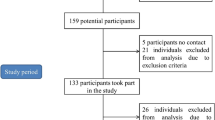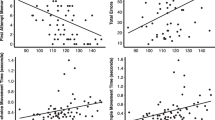Abstract
Purpose
This study examined whether decline in cognitive function is related to arterial stiffness and reduction in physical fitness in middle-aged and older adults.
Methods
A total of 1554 healthy middle-aged and older adults participated in this study. The trail making test parts-A (TMT-A) and B (TMT-B), brachial-ankle pulse wave velocity (baPWV), grip strength, the 30-s chair stand (CS-30) test, the 6-min walk (6MW) test, the 8-foot up-and-go (8UG) test and gait assessment were performed. Participants were classified into a middle-aged group (40–64 years; mean, 50.4 ± 0.2 years) or an older group (≥ 65 years; mean, 73.1 ± 0.5 years), as well as into three cognition (COG) groups (high, moderate, and low) based on median TMT-A and -B scores (high scores on both, either, or neither TMT-A and -B, respectively).
Results
The results revealed that baPWV was significantly lower in the high-than in the moderate- and low-COG groups in both middle-aged and older adults (P < 0.05). In addition, except for a few parameters (e.g., 6MW test in middle-aged adults), physical fitness was significantly higher in the high-than in the moderate- and low-COG groups in both middle-aged and older adults (P < 0.05). Multivariate regression analysis revealed that baPWV (P < 0.05) and some physical fitness indicators (grip strength, CS-30, and 8UG) were significantly independently associated with both TMT-A and -B in the middle-aged and older groups (P < 0.05).
Conclusion
These results suggest that increased arterial stiffness and reduced physical fitness are associated with impaired cognitive function in middle-aged and older adults.
Similar content being viewed by others
References
Tilburgs B, Vernooij-Dassen M, Koopmans R et al (2018) Barriers and facilitators for GPs in dementia advance care planning: a systematic integrative review. PLoS ONE 13:e0198535. https://doi.org/10.1371/journal.pone.0198535
Gorelick PB, Scuteri A, Black SE et al (2011) Vascular contributions to cognitive impairment and dementia: a statement for healthcare professionals from the American Heart Association/American Stroke Association. Stroke 42:2672–2713. https://doi.org/10.1161/STR.0b013e3182299496
Scuteri A, Tesauro M, Appolloni S et al (2007) Arterial stiffness as an independent predictor of longitudinal changes in cognitive function in the older individual. J Hypertens 25:1035–1040. https://doi.org/10.1097/HJH.0b013e3280895b55
Taniguchi Y, Fujiwara Y, Nofuji Y et al (2015) Prospective study of arterial stiffness and subsequent cognitive decline among community-dwelling older Japanese. J Epidemiol 25:592–599. https://doi.org/10.2188/jea.JE20140250
Watson NL, Sutton-Tyrrell K, Rosano C et al (2011) Arterial stiffness and cognitive decline in well-functioning older adults. J Gerontol A Biol Sci Med Sci 66:1336–1342. https://doi.org/10.1093/gerona/glr119
Pase MP, Himali JJ, Mitchell GF et al (2016) Association of aortic stiffness with cognition and brain aging in young and middle-aged adults: the Framingham third generation cohort study. Hypertension 67:513–519. https://doi.org/10.1161/HYPERTENSIONAHA.115.06610
Sperling RA, Aisen PS, Beckett LA et al (2011) Toward defining the preclinical stages of Alzheimer’s disease: recommendations from the National Institute on Aging-Alzheimer’s Association workgroups on diagnostic guidelines for Alzheimer’s disease. Alzheimers Dement 7:280–292. https://doi.org/10.1016/j.jalz.2011.03.003
Nieto ML, Albert SM, Morrow LA et al (2008) Cognitive status and physical function in older African Americans. J Am Geriatr Soc 56:2014–2019. https://doi.org/10.1111/j.1532-5415.2008.01938.x
Baldasseroni S, Mossello E, Romboli B et al (2010) Relationship between cognitive function and 6-minute walking test in older outpatients with chronic heart failure. Aging Clin Exp Res 22:308–313. https://doi.org/10.1007/BF03324936
Cekok K, Kahraman T, Duran G et al (2020) Timed up and go test with a cognitive task: correlations with neuropsychological measures in people with Parkinson’s disease. Cureus 12:e10604. https://doi.org/10.7759/cureus.10604
Placido J, Ferreira JV, de Oliveira F et al (2019) Association among 2-min step test, functional level and diagnosis of dementia. Dement Neuropsychol 13:97–103. https://doi.org/10.1590/1980-57642018dn13-010011
Buracchio T, Dodge HH, Howieson D et al (2010) The trajectory of gait speed preceding mild cognitive impairment. Arch Neurol 67:980–986. https://doi.org/10.1001/archneurol.2010.159
Tombaugh TN (2004) Trail Making Test A and B: normative data stratified by age and education. Arch Clin Neuropsychol 19:203–214. https://doi.org/10.1016/S0887-6177(03)00039-8
Orlando G, Bubbear J, Clarke S et al (2022) Physical function and physical activity in adults with X-linked hypophosphatemia. Osteoporos Int 33:1485–1491. https://doi.org/10.1007/s00198-022-06318-w
Butlin M, Qasem A (2017) Large artery stiffness assessment using SphygmoCor technology. Pulse (Basel) 4:180–192. https://doi.org/10.1159/000452448
Rabkin SW (2012) Arterial stiffness: detection and consequences in cognitive impairment and dementia of the elderly. J Alzheimers Dis 32:541–549. https://doi.org/10.3233/JAD-2012-120757
van Sloten TT, Protogerou AD, Henry RM et al (2015) Association between arterial stiffness, cerebral small vessel disease and cognitive impairment: a systematic review and meta-analysis. Neurosci Biobehav Rev 53:121–130. https://doi.org/10.1016/j.neubiorev.2015.03.011
Singer J, Trollor JN, Baune BT et al (2014) Arterial stiffness, the brain and cognition: a systematic review. Ageing Res Rev 15:16–27. https://doi.org/10.1016/j.arr.2014.02.002
Palta P, Sharrett AR, Wei J et al (2019) Central arterial stiffness is associated with structural brain damage and poorer cognitive performance: the ARIC study. J Am Heart Assoc 8:e011045. https://doi.org/10.1161/JAHA.118.011045
Csipo T, Lipecz A, Fulop GA et al (2019) Age-related decline in peripheral vascular health predicts cognitive impairment. Geroscience 41:125–136. https://doi.org/10.1007/s11357-019-00063-5
Iulita MF, Noriega de la Colina A, Girouard H (2018) Arterial stiffness, cognitive impairment and dementia: confounding factor or real risk? J Neurochem 144:527–548. https://doi.org/10.1111/jnc.14235
Mitchell GF, Guo CY, Benjamin EJ et al (2007) Cross-sectional correlates of increased aortic stiffness in the community: the Framingham Heart Study. Circulation 115:2628–2636. https://doi.org/10.1161/CIRCULATIONAHA.106.667733
Kim DH, Grodstein F, Newman AB et al (2015) Microvascular and macrovascular abnormalities and cognitive and physical function in older adults: cardiovascular health study. J Am Geriatr Soc 63:1886–1893. https://doi.org/10.1111/jgs.13594
Pase MP, Herbert A, Grima NA et al (2012) Arterial stiffness as a cause of cognitive decline and dementia: a systematic review and meta-analysis. Intern Med J 42:808–815. https://doi.org/10.1111/j.1445-5994.2011.02645.x
Gardener H, Wright CB, Dong C et al (2016) Ideal cardiovascular health and cognitive aging in the northern Manhattan Study. J Am Heart Assoc 5:e002731. https://doi.org/10.1161/JAHA.115.002731
Aggarwal NT, Wilson RS, Beck TL et al (2006) Motor dysfunction in mild cognitive impairment and the risk of incident Alzheimer disease. Arch Neurol 63:1763–1769. https://doi.org/10.1001/archneur.63.12.1763
Liu Y, Cao X, Gu N et al (2019) A prospective study on the association between grip strength and cognitive function among middle-aged and elderly Chinese participants. Front Aging Neurosci 11:250. https://doi.org/10.3389/fnagi.2019.00250
Waite LM, Grayson DA, Piguet O et al (2005) Gait slowing as a predictor of incident dementia: 6-year longitudinal data from the Sydney Older Persons Study. J Neurol Sci 229–230:89–93. https://doi.org/10.1016/j.jns.2004.11.009
Camargo EC, Weinstein G, Beiser AS et al (2016) Association of physical function with clinical and subclinical brain disease: the Framingham Offspring Study. J Alzheimers Dis 53:1597–1608. https://doi.org/10.3233/JAD-160229
Fujii Y, Seol J, Joho K et al (2021) Associations between exercising in a group and physical and cognitive functions in community-dwelling older adults: a cross-sectional study using data from the Kasama Study. J Phys Ther Sci 33:15–21. https://doi.org/10.1589/jpts.33.15
Hooghiemstra AM, Ramakers I, Sistermans N et al (2017) Gait speed and grip strength reflect cognitive impairment and are modestly related to incident cognitive decline in memory clinic patients with subjective cognitive decline and mild cognitive impairment: findings from the 4C study. J Gerontol A Biol Sci Med Sci 72:846–854. https://doi.org/10.1093/gerona/glx003
Edwards MK, Loprinzi PD (2017) Combined associations of sedentary behavior and cardiorespiratory fitness on cognitive function among older adults. Int J Cardiol 229:71–74. https://doi.org/10.1016/j.ijcard.2016.11.264
Barnes DE, Yaffe K, Satariano WA et al (2003) A longitudinal study of cardiorespiratory fitness and cognitive function in healthy older adults. J Am Geriatr Soc 51:459–465. https://doi.org/10.1046/j.1532-5415.2003.51153.x
Vance RC, Healy DG, Galvin R et al (2015) Dual tasking with the timed “up & go” test improves detection of risk of falls in people with Parkinson disease. Phys Ther 95:95–102. https://doi.org/10.2522/ptj.20130386
Canevelli M, Cesari M (2015) Cognitive frailty: what is still missing? J Nutr Health Aging 19:273–275. https://doi.org/10.1007/s12603-015-0464-5
Zijlstra LE, Trompet S, Jukema JW et al (2020) Association of cardiovascular structure and function with cerebrovascular changes and cognitive function in older patients with end-stage renal disease. Aging (Albany, NY) 12:1496–1511. https://doi.org/10.18632/aging.102696
McGough EL, Kelly VE, Logsdon RG et al (2011) Associations between physical performance and executive function in older adults with mild cognitive impairment: gait speed and the timed “up & go” test. Phys Ther 91:1198–1207. https://doi.org/10.2522/ptj.20100372
Podsiadlo D, Richardson S (1991) The timed “Up & Go”: a test of basic functional mobility for frail elderly persons. J Am Geriatr Soc 39:142–148. https://doi.org/10.1111/j.1532-5415.1991.tb01616.x
McEniery CM, Yasmin N, Hall IR et al (2005) Normal vascular aging: differential effects on wave reflection and aortic pulse wave velocity: the Anglo-Cardiff Collaborative Trial (ACCT). J Am Coll Cardiol 46:1753–1760. https://doi.org/10.1016/j.jacc.2005.07.037
Hajjar I, Goldstein FC, Martin GS et al (2016) Roles of arterial stiffness and blood pressure in hypertension-associated cognitive decline in healthy adults. Hypertension 67:171–175. https://doi.org/10.1161/HYPERTENSIONAHA.115.06277
Laere E, Tee SF, Tang PY (2018) Assessment of cognition in schizophrenia using trail making test: a meta-analysis. Psychiatry Investig 15:945–955. https://doi.org/10.30773/pi.2018.07.22
Guyette FX, Morley JL, Weaver MD et al (2013) The effect of shift length on fatigue and cognitive performance in air medical providers. Prehosp Emerg Care 17:23–28. https://doi.org/10.3109/10903127.2012.710719
Acknowledgements
The authors would like to thank participants and all measurement staff at Nippon Sport Science University for physical fitness test.
Funding
There are no funding sources for the present study.
Author information
Authors and Affiliations
Corresponding author
Ethics declarations
Conflict of interest
The authors have no conflict of interest to declare.
Statement of human and animal rights
This study was approved by the Ethics Committee of Nippon Sport Science University (017-H075).
Informed consent
Informed consent was obtained from all participants.
Additional information
Publisher's Note
Springer Nature remains neutral with regard to jurisdictional claims in published maps and institutional affiliations.
Rights and permissions
Springer Nature or its licensor (e.g. a society or other partner) holds exclusive rights to this article under a publishing agreement with the author(s) or other rightsholder(s); author self-archiving of the accepted manuscript version of this article is solely governed by the terms of such publishing agreement and applicable law.
About this article
Cite this article
Nihei, S., Ogawa, M., Hashimoto, Y. et al. Arterial stiffness and physical fitness on cognitive function in community-dwelling middle-aged and older adults. Aging Clin Exp Res 35, 1845–1854 (2023). https://doi.org/10.1007/s40520-023-02470-3
Received:
Accepted:
Published:
Issue Date:
DOI: https://doi.org/10.1007/s40520-023-02470-3




